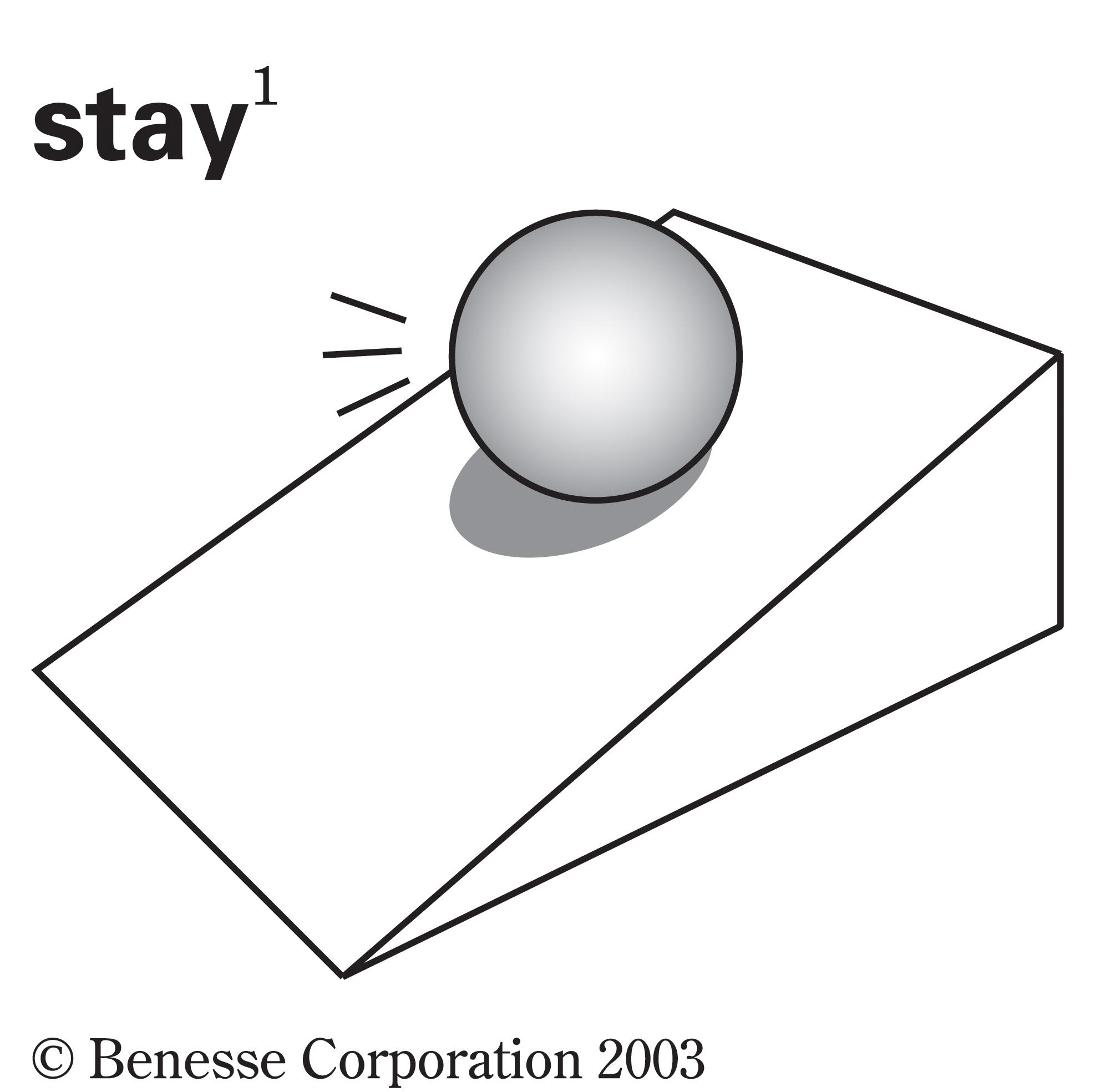stayとは 意味・読み方・使い方
追加できません
(登録数上限)
意味・対訳 (場所に)居残る、とどまる、(場所に)とどまる、ゆっくりして(…に)付き合う、滞在する、客となる、(…に)滞在する、宿泊する、家に泊まる、(…の)ままでいる
| 覚え方 |

|
違う場所や状態に移行せずに,とどまる⇒remain【ネットワーク】 |
stayの |
stayの |
|
stayの |
stayの学習レベル | レベル:1英検:3級以上の単語学校レベル:中学以上の水準TOEIC® L&Rスコア:220点以上の単語 |
研究社 新英和中辞典での「stay」の意味 |
|
stay1
| be hére to stáy | have còme to stáy |
| stày áfter | stày awáy |
| stày ín | stáy lóose |
| stày ón | stày óut |
| stày óver | stày pút |
| stáy the cóurse | stày úp |
stay2
stay3
法律のほかの用語一覧
-
履歴機能
 過去に調べた
過去に調べた
単語を確認! -
語彙力診断
 診断回数が
診断回数が
増える! -
マイ単語帳
 便利な
便利な
学習機能付き! -
マイ例文帳
 文章で
文章で
単語を理解! -

Eゲイト英和辞典での「stay」の意味 |
|
stay
覚え方違う場所や状態に移行せずに,とどまる⇒remain【ネットワーク】
 |
動詞
1(場所に)とどまる,いる(場所を表す副詞(句)を伴う)
|
2滞在する,泊まる(場所を表す副詞(句)を伴う)
3(競争などで)もちこたえる,耐える,やり通す
4…の状態のままでいる(形容詞・名詞・分詞などを伴う)
他動詞((かたい))(物)を支える;(人)の心を支える
他動詞
2≪法≫(刑の執行など)を延期する,猶予する
3…を一時的に抑える,静める
4(競争などで)…をもちこたえる,耐える,やり通す
|
成句stay away from ...
①…から離れて近づかない
②…を欠席する
成句stay down
①しゃがんだままでいる
②(価格などが)下がったままである
③(食べた物が)(吐かれずに)胃におさまっている
成句stay in
(外出せずに)家にいる
|
成句stay on
①上にのったままである
②(電気などが)ついたままである
③〈…に〉居続ける,居残る〈at〉;残業する
成句stay out
①外出している,家に帰らない
②ストライキを続行する
成句stay out of ...
…にかかわらない,手を出さない
成句stay over
泊まる
成句stay up
①(寝ないで)起きている
②(価格などが)上がったままである
成句stay with ...
①(人)の家に泊まる
②((口))(人)の話をずっと聞く
成句be here to stay
((口))定着している,日常的なものとなっている
成句come to stay
①泊まりに来る
②((口))定着している,日常的なものとなっている(通例完了形で用いる)
成句stay put
((口))動かない,じっとしている
名詞
Weblio実用英語辞典での「stay」の意味 |
|
stay
「stay」とは・「stay」の意味
stay①動詞:滞在する、留まる、〜のままでいる
名詞:滞在、延期、猶予
stay②
名詞:支柱、頼り
動詞:〜を支柱で支える、(精神的に)励ます
stay③
名詞:【航海、海語】支索、ステー
動詞:【航海、海語】(帆を)支索で支える
stay①の用法
動詞
滞在する、留まる、〜のままでいる「stay」が動詞として使われる場合、ある場所に一定期間留まること、ある状態や位置に留まること、状態を変えずにいることを示す。具体的な例を以下に示す。
・例文1. We decided to stay at a luxury hotel for our anniversary.(私たちは記念日に高級ホテルに滞在することにした。)
2. Please stay where you are until help arrives.(助けが来るまでその場に留まっていてください。)
3. Despite the challenges, she stayed strong.(困難にもかかわらず、彼女は強いままでいた。)
名詞
滞在、延期、猶予「stay」が名詞として使われる場合、ある場所に一定期間留まること、何かの実行を一時的に延期すること、または猶予期間を示す。具体的な例を以下に示す。
・例文1. My stay in Japan was an unforgettable experience.(日本での滞在は忘れられない経験だった。)
2. The court granted a stay of execution.(裁判所は執行の延期を認めた。)
3. The judge gave him a stay of 30 days to pay the fine.(裁判官は彼に罰金を支払うための30日間の猶予を与えた。)
stay②の用法
名詞
支柱、頼り「stay」が名詞として使われる場合、物理的な支柱や精神的な支えを意味する。具体的な例を以下に示す。
・例文1. The old barn was held up by wooden stays.(その古い納屋は木製の支柱で支えられていた。)
2. During difficult times, my family is my stay.(困難な時期には、家族が私の頼りだ。)
3. He installed some extra stays to strengthen the fence.(彼はフェンスを強化するために追加の支柱を設置した。)
動詞
〜を支柱で支える、(精神的に)励ます「stay」が動詞として使われる場合、物を支柱で支えることや、人を精神的に励ますことを示す。具体的な例を以下に示す。
・例文1. We need to stay the roof with these beams to prevent collapse.(崩壊を防ぐために、これらの梁で屋根を支える必要がある。)
2. Her kind words stayed him during his time of grief.(彼の悲しみの時に、彼女の優しい言葉が彼を励ました。)
3. The engineer stayed the tower with cables to enhance its stability.(エンジニアは安定性を高めるために、タワーをケーブルで支えた。)
stay③の用法
名詞
【航海、海語】支索、ステー「stay」が名詞として使われる場合、特に船舶において帆やマストを支えるためのロープやケーブルを指す。具体的な例を以下に示す。
・例文1. The captain ordered the crew to check the stays for any signs of wear.(船長は乗組員に摩耗の兆候がないか支索を点検するよう命じた。)
2. During the storm, one of the main stays snapped.(嵐の最中に、主要な支索の一つが切れた。)
3. The stays are essential for the structural integrity of the ship.(支索は船の構造的完全性に不可欠である。)
動詞
【航海、海語】(帆を)支索で支える「stay」が動詞として使われる場合、船舶において帆を支索で支える行為を指す。具体的な例を以下に示す。
・例文1. The crew worked quickly to stay the sails before the wind picked up.(風が強まる前に、乗組員は帆を支索で支える作業を迅速に行った。)
2. Staying the mizzenmast required coordination among the sailors.(ミズンマストを支索で支えるには、船員の間の調整が必要だった。)
3. After repairing the broken stay, they could finally stay the jib sail properly.(壊れた支索を修理した後、彼らはついにジブセールを適切に支索で支えることができた。)
コア・セオリー英語表現(基本動詞)での「stay」の意味 |
|
stay
| コアとなる意味 | 《違う場所や状態に移行せずに,とどまる》 |
| ポイント | 「場にとどまる」が最も基本的な意味.「状態」を抽象的な「場」としてとらえることによって「状態にとどまる」という意味が生じる.自動詞用法が中心で,他動詞用法は「...の間とどまる」と「...をとどめる」の意に限られる. |
- We stayed (at) home.
私達は(外出せずに)家にいた - Don't stay too long at the party.
あんまりパーティーに長居しちゃいけませんよ - You can stay in the car if you want.
車の中にいたければいてもいいですよ - stay in bed
(起きずに)寝床にいる - Stay by my side.
私のそばを離れないで - Please go ahead; I'll stay behind .
先に行ってください,私はとどまりますから - Stay where you are.
動かずにそこにいなさい - stay for[to]supper
夕食までゆっくりしていく - Few members wanted to stay after the meeting.
会議の後で残りたいと思うメンバーはほとんどいなかった - I will stay to see you are all right.
君の状況がうまくいくのを見届けるべく(ここに)とどまりましょう
(【語法】stayの後にhereを補って考えれば,to see以下が目的を表す副詞的用法の不定詞だとわかる)
②((stay+形容詞, 形容詞相当語句で))(ある状態に)とどまる
- The weather will stay fine.
好天が続くでしょう - He stayed angry at her for weeks.
彼は彼女に対して数週間腹を立ていた - Those pubs stay open until midnight.
あれらの居酒屋は深夜まで開いている - These animals have to stay still to conserve energy.
これらの動物は体力を温存するためにじっとしていなければならない - stay awake
(眠らずに)目を覚ましている - What we should do is stay united.
われわれがなすべきことは結束を維持することだ - Stay tuned.
チャンネルはそのまま
(【関連】テレビやラジオのCM前のセリフ.Stay with us.とも言う) - This agreement will stay in force for a century.
この合意は1世紀にわたって有効である
(→in force は「有効で」の意で,形容詞的な働きをしている)
Weblio英和対訳辞書での「stay」の意味 |
|
live [stay]
stay
stay
stay
京都弁おいない
stay
stay
stay ...
stay [lodge]
stay [stop]
Stay
Stay (2005 film)
Stay (miniseries)
Wiktionary英語版での「stay」の意味 |
Stay
統計情報
- According to the 2010 United States Census, Stay is the 28263rd most common surname in the United States, belonging to 846 individuals. Stay is most common among White (90.9%) individuals.
|
|
|
|
stayのページの著作権
英和辞典
情報提供元は
参加元一覧
にて確認できます。
| Copyright (c) 1995-2024 Kenkyusha Co., Ltd. All rights reserved. | |
| Copyright © Benesse Holdings, Inc. All rights reserved. | |
| Copyright (C) 2024 田中茂範 All rights reserved. | |
| © 2000 - 2024 Hyper Dictionary, All rights reserved | |
| Copyright (C) 1994- Nichigai Associates, Inc., All rights reserved. | |
| ※この記事は「日本法令外国語訳データベースシステム」の2010年1月現在の情報を転載しております。 | |
| DBCLS Home Page by DBCLS is licensed under a Creative Commons 表示 2.1 日本 License. | |
| All Rights Reserved, Copyright © Japan Science and Technology Agency | |
| Copyright (C) 2024 ライフサイエンス辞書プロジェクト | |
|
日本語ワードネット1.1版 (C) 情報通信研究機構, 2009-2010 License All rights reserved. WordNet 3.0 Copyright 2006 by Princeton University. All rights reserved. License |
|
| Copyright(C)2002-2024 National Institute of Information and Communications Technology. All Rights Reserved. | |
| Copyright © 2024 CJKI. All Rights Reserved | |
|
Copyright (C) 1994- Nichigai Associates, Inc., All rights reserved. 「斎藤和英大辞典」斎藤秀三郎著、日外アソシエーツ辞書編集部編 |
|
|
Text is available under Creative Commons Attribution-ShareAlike (CC-BY-SA) and/or GNU Free Documentation License (GFDL). Weblio英和・和英辞典に掲載されている「Wiktionary英語版」の記事は、WiktionaryのStay (改訂履歴)の記事を複製、再配布したものにあたり、Creative Commons Attribution-ShareAlike (CC-BY-SA)もしくはGNU Free Documentation Licenseというライセンスの下で提供されています。 |
|
| CMUdict | CMUdict is Copyright (C) 1993-2008 by Carnegie Mellon University. |
ピン留めアイコンをクリックすると単語とその意味を画面の右側に残しておくことができます。 |
|
ログイン |
Weblio会員(無料)になると
|
weblioのその他のサービス
|
ログイン |
Weblio会員(無料)になると
|
